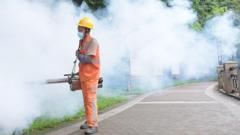As the United States reports a rising number of measles cases linked to summer travel, experts emphasize the importance of vaccinations and protective measures to safeguard vulnerable populations.
# Measles Cases Surge Amid Summer Travel Concerns

# Measles Cases Surge Amid Summer Travel Concerns
Measles outbreaks threaten public health as travel resumes, but vaccinations can mitigate risk.
In 2025, measles has re-emerged as a significant public health concern in the United States, with over a thousand reported cases, primarily connected to an ongoing outbreak in Texas that has sadly led to at least three fatalities. The highly contagious nature of the measles virus raises urgent concerns as summer travel intensifies, creating potential hotspots for transmission in crowded areas.
Travel-related outbreaks are not a new phenomenon; one of the most notable instances occurred in 2014 at Disneyland, where exposure led to over 100 cases. The summer travel season poses particular risks as individuals may encounter crowded transportation hubs and destinations, increasing the likelihood of encountering the virus.
Fortunately, an effective vaccine is available, which safeguards individuals against measles. It is crucial for families planning to travel to ensure that all eligible members are fully vaccinated before venturing out. This precaution can substantially lower the risk of infection and contribute to the community’s overall safety.
The transmission dynamics of measles are alarming. The virus can remain airborne for hours and survive on surfaces, meaning that one does not need to be in close proximity to an infected person to contract the virus. Individuals who are infected begin shedding the virus several days before the telltale rash appears, often presenting with a severe runny nose, indicative of viral shedding.
To mitigate risk, those who are unvaccinated or immunocompromised should consider wearing masks in potentially crowded public spaces like airports and airplanes. Masks not only provide a barrier against measles but also protect against a variety of other infectious diseases that thrive in high-density environments. High-risk individuals may also benefit from avoiding crowded indoor venues altogether during this period of heightened vulnerability.
As summer travel continues and cases rise, public awareness and vaccination efforts remain critical to controlling the spread of measles and protecting those most at risk.
Travel-related outbreaks are not a new phenomenon; one of the most notable instances occurred in 2014 at Disneyland, where exposure led to over 100 cases. The summer travel season poses particular risks as individuals may encounter crowded transportation hubs and destinations, increasing the likelihood of encountering the virus.
Fortunately, an effective vaccine is available, which safeguards individuals against measles. It is crucial for families planning to travel to ensure that all eligible members are fully vaccinated before venturing out. This precaution can substantially lower the risk of infection and contribute to the community’s overall safety.
The transmission dynamics of measles are alarming. The virus can remain airborne for hours and survive on surfaces, meaning that one does not need to be in close proximity to an infected person to contract the virus. Individuals who are infected begin shedding the virus several days before the telltale rash appears, often presenting with a severe runny nose, indicative of viral shedding.
To mitigate risk, those who are unvaccinated or immunocompromised should consider wearing masks in potentially crowded public spaces like airports and airplanes. Masks not only provide a barrier against measles but also protect against a variety of other infectious diseases that thrive in high-density environments. High-risk individuals may also benefit from avoiding crowded indoor venues altogether during this period of heightened vulnerability.
As summer travel continues and cases rise, public awareness and vaccination efforts remain critical to controlling the spread of measles and protecting those most at risk.




















